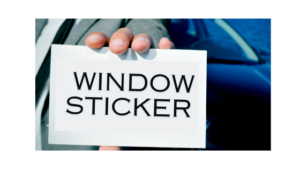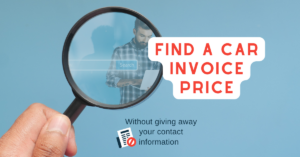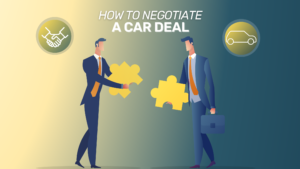Have you ever walked into a car dealership and felt unsure about how to get a good deal on a car and worried about not knowing how to haggle car price?
Knowing if you’re paying the right price or how to talk it down can be hard. It’s a big decision, and it’s important to get it right.
In this article, we will show you how to haggle the price of a car like a pro.
We’ll give you all the insider tips and tricks to feel confident and get the best deal possible.
So whether you’re buying your first car or your fifth, buckle up and get ready to learn how to haggle car prices and save some money and get peace of mind!
Let’s get started!

Table of contents
Understanding the Basics of Car Buying
Preparing for the Negotiation
Step-By-Step Guide to Haggle Car Price
How to Respond to the Initial Offer
How to Make a Counter-Offer
How to Handle Common Sales Tactics
How to Walk Away from a Bad Deal
Advanced Negotiating Techniques for How to Haggle Car Price
The Role of Trade-Ins in Negotiations
Closing the Deal
Why Hiring a Professional Can Help
Conclusion
Understanding the Basics of Car Buying
Imagine negotiating a car deal with a professional salesman and having confidence in knowing all the car buying terminology used.. Like “MSRP,” “Invoice Price,” and “Financing.”
Wouldn’t that help to make buying a car a lot easier?
In this section, we will teach you the basics of buying a car so you can learn how to haggle car price.
We’ll explain these terms in a way that’s easy to understand, so the next time you’re at the dealership, you’ll feel like a car-buying expert.
Ready to become a savvy car shopper?
Let’s dive in and learn about the basics of car buying!
MSRP and Invoice Price
Let’s start by learning two important terms: MSRP and Invoice Price.
MSRP stands for Manufacturer’s Suggested Retail Price.
It is essentially a price the manufacturer suggests the dealer sell the vehicle for regardless of the invoice amount the dealer has actually paid for the vehicle. You’re not going to find this many places on the internet about the MSRP. But, here’s the tea: MSRP is just a made up number that the car companies set.
In today’s market, dealerships are adding markup’s. These can be called different things at different dealers. Some use the term Dealer Markup, Adjusted Dealer Markup (ADM), Market Adjustment among many others. They all mean the same thing.
In the good old days you could expect that dealerships would price their vehicles below MSRP. This is not always the case. Additionally, because of the way dealers list pricing online, you may not be aware of a markup over MSRP until you get down to the details of the deal or seeing it all line-itemed in a buyer’s order.
Now, let’s talk about the Invoice Price.
This is what the dealership pays the manufacturer to get the car. Imagine buying a loveseat for $5, then selling it to your friend for $10. The $5 you paid is like the car Invoice Price.
You can find the invoice price for a car on sites like JD Power. But, the truth is, no one really can know the invoice price for a vehicle other than the dealership. You can ask them to show it to you and sometimes they will. Others won’t.
There is a lot of old information out there about MSRP vs Invoice and negotiating from those numbers so it’s good to have a proper understanding of what they really mean as you begin car shopping.
Do Your Research Before Starting the Negotiation
Remember doing a school project without researching it first?
It’s pretty tough.
The same goes for buying a car. Doing your homework before you start negotiating for a car is super important.
It’s important to understand that sites like TrueCar will display prices as a “good deal”. And the consumer understands that to be what they think other people are paying for the same car.
Part of your homework is finding the vehicles your interested in and calling the dealership to see if the good deal you found is even a car available at the listed dealership.
Strange, right?
Why would a car be listed if it’s not available?
This is the reality of the car market today. Some dealerships have mystery cars listed and when you get to the actual dealership they may tell you that the vehicle is no longer there. They can also list that vehicle on Truecar or cars.com and it be rated as a “good deal” but when you get to the actual deal and make your way to the finance office, the dealer has added on a package you don’t want, essentially a markup and now that “good deal” is turning into a bad deal.
This is why your homework needs to be done at home before you even step foot on a dealership lot.
You can start your research on websites like Kelley Blue Book or Cars.com to find similar vehicles.
When comparing vehicle list prices there are many factors to consider. You need to be looking at a vehicle with the same year, similar miles (if buying used), packages and make/models.
Once you find similar cars, you need to call the dealership directly to find pricing information. And don’t forget to check out the car’s vehicle history report if you’re buying a used car.
You can also read reviews about safety or other features that may be important to you.
So remember, just like when you were in school, homework is to be done AT HOME, not at the dealership.
Understanding Financing, If Applicable
When buying a car, there’s so much more to consider than just the sticker price.
Financing is one of those things that can greatly affect the total cost of your vehicle.
Imagine financing like this: It’s a way to break up the cost of the car into smaller, more manageable payments spread out over time.
Instead of paying the full price of the car all at once, you borrow money from a lender like a bank or credit union, and then you pay that money back, typically each month, over a set period.
Here’s the catch: you also have to pay interest, a fee the lender charges for letting you use their money. Over time, those interest charges can add up, making the total cost of the car significantly higher than the original price tag.
That’s why it’s vital to understand the terms of any financing deal. Know how much you’ll pay each month, your interest rate, and how long you’ll be making payments.
Getting pre-approved by a Credit Union for an auto loan before you go to the dealership can also be a helpful step. This means a lender has already agreed to give you a loan up to a certain amount, which can help you know what price range to stick to when shopping for a car.
Remember, understanding your financing options can be as important as negotiating a good price when getting a great deal on a car.
So take the time to research, ask questions, and ensure you fully understand your financing before you sign on the dotted line.

Preparing for the Negotiation
Now that you have a solid grasp of the basics of car buying, it’s time to shift gears and prepare for the negotiation.
This part might seem intimidating, but remember, knowledge is power. The more prepared you are, the better position you’ll be in to secure a great deal.
This section will guide you in effectively preparing for the negotiation, covering important aspects like determining your budget, getting pre-approved for a loan, and doing the necessary research.
By the end of this section, you’ll be equipped with the right tools and information to engage in the negotiation process confidently.
Let’s get started!
How to Determine Your Budget and Stick to It
Determining your budget is a crucial aspect of preparing for car negotiation.
Your budget should clearly reflect what you can afford to spend, keeping in mind both the initial cost of the car and ongoing expenses like fuel, insurance, and maintenance. You also need to have realistic expectations for what a car costs.
Start by taking a close look at your monthly income and expenses.
How much do you have left after paying for necessities like rent, food, utilities, and other regular payments or debt obligations?
A common rule is that all your monthly car expenses should not exceed 15-20% of your take-home pay.
Once you’ve determined your budget, it’s time to stick to it. It’s easy to be swayed by attractive features or upgrades, but remember that these extras have a higher price tag. Before making any decisions, ask yourself whether you need the features and whether they’re worth going over your budget.
Getting pre-approved for a loan can also help enforce your budget.
With pre-approval, a lender agrees in advance to loan you a certain amount. This gives you a clear understanding of what you can afford before stepping foot in the dealership, reducing the risk of overspending.
Sticking to your budget also means being ready to walk away if the dealership can’t meet your price. The goal is to find a vehicle you like at a price that fits your budget. Sticking to your budget ensures your new car is not a financial burden.

Getting Pre-Approved for a Loan
Getting pre-approved for an auto loan is a savvy move that can put you in a strong position when negotiating a car price. We always suggest working with a local credit union.
But what does pre-approval mean, and why is it so important?
Pre-approval is a lender’s promise to loan you up to a certain amount for your car purchase, provided you meet certain conditions. This process involves a deeper look at your credit history and financial situation than an initial loan qualification.
There are several reasons why getting pre-approved for a loan is a smart strategy.

Understanding Your Budget
With pre-approval, you’ll know how much money you can borrow, helping you narrow your car choices to those you can comfortably afford.
Negotiation Advantage
Knowing you are preapproved and knowing the interest rate you can get through your credit union can help with negotiations.
Interest Rate Comparison
When you get pre-approved, you’ll see the interest rate and terms you qualify for. This allows you to compare your lender’s loan offer with the dealership’s financing offer, ensuring you get the best deal.
Saves Time
Having your financing already set up can significantly reduce the Time spent at the dealership, making the car-buying process faster and more efficient.
Dealer Financing
Sometimes, it’s best to use dealer financing and they can reduce the purchase price if that means they can do the financing.
You want to keep an open mind on how to go about financing because the deal can be structured in different ways to allow you and the dealer to benefit.
Remember, getting pre-approved doesn’t mean you must take the loan. You can still choose not to use it or go with another lender if you find better terms.
But it does give you a clear sense of your budget and puts you in a stronger position when you’re ready to buy.

Step-By-Step Guide for How to Haggle Car Price
With a solid understanding of car buying basics and your preparation complete, it’s time to dive into the heart of the matter: haggling the car price.
Don’t worry if the word ‘haggle’ makes you nervous; it’s another term for ‘negotiation.’
And the good news?
Anyone can become adept at it with a little knowledge and practice.
In this section, we’ll guide you step-by-step through the negotiation process. From making the initial offer to closing the deal, we’ll arm you with the tips and strategies to navigate this important phase of your car-buying journey.
You should have realistic expectations and remember the goal is not to necessarily beat the dealer but rather to get a fair and good price in your budget by making dealers compete for your business. This will allow you to feel satisfied with your purchase and walk away knowing you haven’t been ripped off.
Ready to become a master negotiator?
Let’s get started!
Start with Opening the Negotiation
Opening the negotiation is your first step in the haggling process.
It’s natural to feel a little nervous, but remember, you’ve done your homework, have a solid understanding of the car’s fair price, and are prepared.
Here’s how you can start the negotiation effectively.

Contact Each Dealer
You’ve already done your research and found and located the vehicles you want to call on.
Call each dealership and request a buyer’s order or price or menu as some dealers call them. Tell them you are interested in buying the vehicle and ask them to send over the sale price in writing with all addendums with an out the door number. And ask them to send that in writing on a buyer’s order. They can email it or even text it.
Once you receive buyers orders from multiple dealerships on similar vehicles you will begin to notice the difference in pricing from one dealer to the next.
Be Direct and Polite
To get a dealership to send you pricing, begin the conversation confidently. Express your interest in the car and clearly state that you won’t be coming into the dealership until you know what the OTD number is.
Once they give you that information then you can agree to come in.
Stay Calm and Composed
Some dealerships will refuse to give you pricing information over the phone.
Typically, they don’t want to give you pricing on a buyer’s order because they don’t want you to shop for it.
Our car buying advocates respect the dealership and salespeople by not sharing quotes from one dealer to another. We simply explain that the most aggressive offer will be their best bet to win the business. Some dealers are willing to play and others won’t.
Once you see various prices you can decide which vehicle you really want if there are any differences between them and begin making a counteroffer if it’s appropriate.
Be Prepared for a Counteroffer
In most cases, the dealer will return with a counteroffer higher than your initial offer. That’s normal. Remember, this is a back-and-forth process until both parties reach a mutually agreed price.
Don’t Feel Pressured
It’s okay if the negotiation doesn’t conclude immediately.
Taking a break or returning another day is not a sign of defeat. Feeling comfortable with the purchase decision is essential, so don’t let the pressure rush you.
However, in a market with low inventory, sometimes you do need to be ready to pull the trigger quickly. Otherwise, a vehicle can be sold right out from under you.
Remember, the only way to know you’ve gotten the absolute best deal is if you contacted every dealership in the country and we know there’s not enough time for that.
If you’ve reached out to four to five dealers and received buyers orders, you can feel good that you have done your due diligence.
After all, if you only go to one dealership, you have nothing to compare your deal with so you have no idea whether it is a good deal or not.
So, stay patient and persistent, and you’ll be on your way to a successful negotiation.

How to Respond to the Initial Offer
Once you’ve made your initial offer, the dealer will likely respond with a counteroffer. This is a normal part of the negotiation process, and how you respond can significantly impact the outcome of your negotiation.
Here are some tips on how to effectively respond to the dealer’s initial offer.
Stay Calm
It’s common for the dealer’s counteroffer to be higher than your initial offer. Remember not to take it personally or let it upset you. Stay calm, composed, and remember that this is a negotiation process.
Evaluate the Counteroffer
Consider the dealer’s counteroffer against the research you’ve conducted and the other pricing you have received. Don’t hesitate to ask the salesperson to justify their price if it’s considerably higher.
Use Your Research
This is when your research comes into play. If the counteroffer is higher than the others you can mention other dealers that are priced lower.
Be Firm, Yet Polite
If the dealer’s offer is still higher than you’re willing to pay, politely but firmly stick to your range. You can say, “I understand your position, but based on my research and budget, I’m comfortable paying X.”
Prepare to Walk Away
If you cannot reach an agreement within your budget, be prepared to walk away. It’s crucial not to rush into a purchase that doesn’t make financial sense for you.
Remember, negotiation is a two-way process, and it’s all about finding a mutually agreeable price. With your research and preparation, you’ll be well-equipped to navigate this stage of the car-buying process.

How to Make a Counter-Offer
Making a counteroffer is a key part of the car price haggling process.
Here’s how you can effectively make a counteroffer.
Be Respectful
Always maintain a polite and professional demeanor. Even if the dealer’s counteroffer is higher than you expected, remember that this is a business transaction, and it’s important to keep emotions out of it.
Know Your Limits
Before making your counteroffer, consider the maximum amount you will pay for the car. This should be within the budget you’ve established for yourself.
Use Your Research
Based on other dealer proposals make a realistic and honest counteroffer. You could say, ” I think X is more reasonable based on other proposals from dealers on this same vehicle”
Give Reasons for Your Counteroffer
When presenting your counteroffer, explain why. They’ll likely ask you if the vehicle has the same package on it, if the miles are similar, to make sure you’re comparing apples to apples. This should be the case so you can easily send them a link to the vehicle listed online somewhere else.
Be Firm But Flexible
While sticking to your budget, be prepared to make small concessions if necessary. The dealer is also running a business and needs to make a profit.
Don’t Reveal Your Top Budget
It’s a good idea not to divulge the maximum amount you’re willing to pay at this stage. Keeping some room for further negotiation can be beneficial.
Making a counteroffer is about balancing what you’re willing to pay and what the dealer is willing to accept. With careful thought, clear communication, and patience, you’ll be able to handle this step like a pro.

How to Handle Common Sales Tactics
As you learn about how to haggle car price, you might encounter various sales tactics from the dealer. While many dealers are straightforward and honest, it’s important to be prepared for these common strategies and know how to handle them.
High-Pressure Sales Tactics
Some dealers may create a sense of urgency, saying that the deal is only good for today or that another buyer is interested in the same car. Stay calm, and don’t feel pressured to make a quick decision. It’s okay to take your time to ensure you’re making the right choice.
The “Four-Square” Method
This is a common sales tactic where the dealer uses a worksheet divided into four parts: your trade-in value, the purchase price, the down payment, and monthly payments.
Stay focused on negotiating the full price of the car first before discussing trade-in values, financing, or extras. The trade in is a separate transaction. If you’re asked early on if you have a trade in, you can simply say you don’t or that you’d like to leave it out at this time as you may sell it to a private party or unsure if you may even keep it.
You only want to bring in the trade when it can benefit you.
Upselling Additional Features or Warranties
Dealers may attempt to increase the sale price by offering additional features, services, or extended warranties. While some of these may be beneficial, others might not be necessary. Stick to your budget and only consider extras if they truly add value and fit within your budget.
Most add ons like nitrogen in tires are just profit centers for the dealership. You can tell them you don’t want it. Window tint is a common add on and typically they won’t remove it.
Warranties are sold in the finance office and if you are a person who likes to buy warranties the best way to go about it is to refuse. You can buy a warranty later after you’ve shopped around.
Additionally, the warranties can be negotiated as well.
Bait and Switch
Sometimes a dealer may advertise a car at a fantastic price to get you into the dealership, only to tell you that it’s already sold and try to steer you towards a more expensive model.
If this happens, don’t be afraid to walk away. This is why we encourage everyone to get pricing over the phone on a written or printed buyers order. If a dealer is pricing a vehicle online and it seems too good to be true, it probably is.
Don’t waste your day going to a dealership only to find out the car doesn’t even exist or the price is not what was advertised online.
Changing the Deal Terms
Be vigilant about the terms of your deal. Make sure that everything agreed upon is documented. If anything changes in the finance office, such as the interest rate or loan term, don’t be afraid to question it.
Remember, as a buyer, you hold considerable power in the negotiation process because you have the money. You can always walk away if you’re uncomfortable with the tactics or deal offered. By recognizing these common sales tactics, you can confidently navigate your negotiation and secure a fair deal on your new car.

How to Walk Away from a Bad Deal
Sometimes, the best decision might be to walk away, no matter how much you want a particular car or how much time you’ve invested in the negotiation.
Recognizing when you’re facing a bad deal is crucial, and knowing how to exit the situation gracefully is equally important.
Here are some tips.
Know Your Limits
Before entering negotiations, be clear about the maximum amount you’re willing to spend and stick to it. If the dealer won’t meet your price and the deal doesn’t fit within your budget, it may be time to walk away.
Uncomfortable Pressure Tactics
If the dealer uses high-pressure sales tactics that make you uncomfortable or rush you to make a decision, it’s a good indication that you should consider leaving. It’s hard for any salesman to pressure you when you are negotiating over the phone. This is why we advise you to do the negotiating over the phone and not on the dealers turf. They have the home field advantage if you are there on their lot.
Hidden Costs or Changes
If unexpected costs are added or the terms suddenly change (like the interest rate or the loan length), take this as a red flag.
Lack of Transparency
If the dealer is not providing clear answers to your questions, or if something doesn’t seem right, trust your instincts.
How to Walk Away
Politely but firmly express that you don’t think you can agree on a deal that day. Thank the salesperson for their time. There’s no need for a lengthy explanation; “I need some time to think it over” is sufficient.
Don’t Feel Defeated
Walking away doesn’t mean you’ve failed. On the contrary, it shows you’re committed to finding a car that fits your needs and budget.
Remember, buying a car is a significant investment. You should feel confident and comfortable with your purchase and the deal you’re getting. Don’t be afraid to leave a negotiation not in your favor.

Advanced Negotiating Techniques
Now that we’ve covered the basics of negotiating and walked you through the step-by-step process, it’s time to take your skills to the next level.
Welcome to advanced negotiating techniques!
This section will delve into more sophisticated strategies to help you get even better results when haggling over the car price.
While these tactics require more practice and confidence, mastering them will give you an edge during negotiation. Ready to take your car buying skills to new heights?
Let’s dive in!
Negotiating Add-Ons and Extras
Buying a car isn’t just about the vehicle itself – it’s also about the extras and add-ons that can enhance your driving experience or protect your investment.
While these extras often come at a premium, you have the power to negotiate these costs as well.
Here’s how.
Know the Market
Do some research on the extras you’re interested in. What do they typically cost? Are there cheaper alternatives outside the dealership? Having this knowledge will help you negotiate a fair price.
Prioritize What You Want
Not all extras are created equal. Some, like upgraded safety features or an extended warranty, may offer more value than aesthetic enhancements like pin striping or premium floor mats. Decide what’s important to you and focus your negotiating efforts there.
Negotiate Separately
Similar to negotiating the price of the car, negotiate the price of add-ons separately. This prevents the costs from being bundled together, which can make it harder to see if you’re getting a good deal.
Don’t Be Afraid to Say No
Just because the dealer offers an extra doesn’t mean you need to take it. If an add-on is too pricey or doesn’t provide enough value, don’t hesitate to decline.
Look for Package Deals
Sometimes, dealers offer package deals on extras, which can be a cost-effective way to get multiple features you want. Ask the dealer if there are any packages that include the add-ons you’re interested in.
Check the Final Contract
Before signing, make sure all agreed upon prices for extras are accurately reflected in the final contract. If there’s a discrepancy, bring it up before you sign.
Remember, while extras and add-ons can enhance your car, they can also significantly add to its cost. By negotiating these items, you can ensure you’re only paying for what you truly want and need, and at a price that feels fair to you.

Negotiating at the End of the Month/Quarter
One strategy that can give you an advantage in car price negotiations is timing your purchase toward the end of the month or quarter.
Here’s why this can work and how to effectively use this strategy.
Understanding Dealer Goals
Car dealers often have monthly or quarterly sales targets set by the manufacturer or their management. As the end of the month or quarter approaches, they may be more willing to negotiate to meet these goals.
Potential for Better Deals
Because of these sales targets, dealers might be more inclined to offer discounts or other incentives to sell cars at the month’s or quarter’s end. This could mean a lower price, better financing, or more attractive add-on packages.
Doing Your Homework Still Matters
While this strategy can be beneficial, it doesn’t replace the importance of research. Knowing the car’s value, understanding your budget, and being prepared to negotiate are still crucial.
Being Flexible Helps
If you’re trying to negotiate at the end of the month or quarter, being flexible about the car’s color or features can help. The dealer might be more motivated to sell certain vehicles on their lot to meet their targets.
But Don’t Rush
Just because it’s the end of the month doesn’t mean you should rush into a deal you’re uncomfortable with. Ensure you’re still following all the steps to get the right buy.
Timing your car purchase for the end of the month or quarter is a strategic move that can lead to better deals.
However, it’s important to remember that this is just one of many strategies and shouldn’t be relied upon solely to secure a great deal. And ultimately the best time to buy is when you actually need a vehicle.

The Role of Trade-Ins in Negotiations
Let’s shift gears and discuss a different aspect of car buying negotiations – trade-ins.
If you plan to trade in your old car as part of the purchase, it can significantly influence the negotiation process.
In this section, “The Role of Trade-Ins in Negotiations,” we will explore how your trade-in can affect the overall deal, how to determine its value, and strategies to negotiate the best possible price for your trade-in. A well-handled trade-in negotiation can save you significant money on your new car purchase.
Whether you’ve gone through the trade-in process before or this is your first time, understanding its role in the negotiation can give you the knowledge you need to navigate this part of the car-buying process confidently.
Let’s dig in!
How to Determine the Value of a Trade-In
If you’re thinking about trading in your current car to help purchase a new one, it’s important to know what your vehicle is worth. By understanding the value of your trade-in, you can negotiate more effectively and ensure you get a fair deal.
Here’s how you can determine the value of your trade-in.
Use Online Tools
Several online resources, like the Kelley Blue Book, can estimate your car’s value based on factors such as age, mileage, condition, make, and model. You should get offers from various online car buying sites like Carvana, CarMax, Vroom, Bring a Trailor, and many others. If you enter the information about your car honestly and accurately you can get a few quotes immediately that dealers will purchase your trade for.
Check Local Listings
Look at the prices of similar cars with similar miles. Search Facebook marketplace for private party sales.
Consider the Car’s Condition
The condition of your car plays a big role in its value. Dents, scratches, interior wear, and tear, or mechanical issues can decrease the value. On the other hand, a car in excellent condition could be worth more.
Remember, It’s a Starting Point
The value you get from these methods is a starting point for negotiations, not a guaranteed price. A dealer might offer less because they need to profit when selling the car.
Knowing the value of your trade-in is crucial in ensuring you get a fair price. Use this information as a tool in your negotiation process, and get as many quotes on your trade-in as you did for your purchase. The trade-in is an entirely separate transaction and should be treated as such. The only way to know if you’ve gotten a good deal on your trade is by shopping for it.
We’ll talk about this next.

How to Negotiate Trade-In Separately from the New Car’s Price
One key strategy in car buying negotiations is to separate the discussion of your trade-in from the price of the new car you’re buying.
Here’s why this is important and how to do it.
Why Separate Negotiations Matter
Dealerships often mix the negotiations for your trade-in and the new car into one conversation. This can make it more difficult to see if you’re getting a fair deal for both. By separating the negotiations, you can focus on getting the best price for each.
Negotiate the New Car Price First
Start by negotiating the price of the new car without mentioning your trade-in. Once you’ve agreed on a price, you can introduce the trade-in into the conversation.
Know Your Trade-In Value
Before you begin negotiations, know the value of your trade-in. When discussing the trade-in price with the dealer, this will give you a ballpark figure.
Be Ready to Negotiate
Just like when buying a car, be prepared to negotiate the price of your trade-in. The dealership will likely start with a lower offer, expecting you to negotiate up from there. If you have multiple offers, you can ask the dealer to beat another offer. If they’re not willing to do that, they may suggest you sell it to that party. Or, they may want to match or beat the price.
Consider Selling Privately
If you’re not satisfied with the trade-in offers you’re receiving, consider selling your car privately. It may be more time-consuming, but you could get a better price.
Remember, your trade-in is an asset, and it’s crucial to negotiate a fair price for it. By separating the negotiation of your trade-in from the new car’s worth, you have a clearer view of the deal you’re getting on both ends.
Where To Trade In
Many consumers assume they should or need to trade in at the same dealership where they are making a purchase and this is not the case.
In fact, it is best to get multiple offers from different dealerships. You should also consider taking your trade in to be appraised at a dealer that is likely to sell that inventory.
For example, if you have a Mercedes trade-in and you are buying a new Jeep, a Mercedes dealer may be willing to pay a little more because it’s perfect inventory as compared to a Jeep dealer.
You can get a dealer to give you a trade value over the phone but most will tell you that you need to bring it in to get a real number. They want to see it in person and they also want you on their turf.
Scheduling a Trade Appraisal
If you have to bring your trade-in to the dealership, make an appointment. Tell them you’ll bring it in and that you have to be somewhere so you will not be staying. Once they do the appraisal, get it in writing and leave. You may want to set a day where you take the car to multiple dealers so you can knock them all out. Then you can compare offers and call them back if you want to negotiate further.

Closing the Deal
Review the Contract Thoroughly Before Signing
Signing the contract is the final step in the car-buying process, but it’s crucial not to rush it. The contract includes all the details of your agreement, so you want to ensure everything is correct before signing.
Here are some tips on reviewing the contract thoroughly.
Now that we’ve covered the various aspects of negotiating a car price let’s turn our attention to the final step: closing the deal. This part of the process is where everything comes together, and it’s equally important to handle it correctly to ensure you’re truly getting the best deal possible.
In this section, “Closing the Deal,” we will walk through the final steps you should take before signing on the dotted line, including reviewing the contract, understanding the financing terms, and knowing what to expect from the sales tax and fees.
It’s the moment of truth – let’s make sure you cross the finish line with confidence and a deal that leaves you satisfied!
Take Your Time
Don’t let anyone rush you through this process. Take your time reading the contract in detail, ensuring you understand every item listed.
Check the Numbers
Verify that the agreed-upon price, trade-in value, and financing terms are correctly stated in the contract. Also, make sure any discounts or incentives have been applied.
Understand the Fees
Dealerships often include various fees, like documentation fees, registration fees, and sales tax. Make sure you understand what each fee is for and that the amounts seem reasonable.
Look for Add-Ons
Check that any add-ons or extras you’ve negotiated are listed with their prices and that no unwanted extras have been included.
Verify Financing Terms
If you’re financing, double-check the interest rate, loan term, and the amount endowed to ensure it matches what you’ve agreed upon.
Ask Questions
Don’t hesitate to ask questions if anything is unclear or doesn’t seem right. It’s important to understand every aspect of the contract before you sign.
Remember, once you sign the contract, you’re legally bound to it. So, reviewing it thoroughly and ensuring it accurately reflects the deal you’ve negotiated is essential.
You’ve worked hard to negotiate a great car deal; this final step ensures you get what you’ve agreed upon.
What to Do After Agreeing On a Price (Financing, Insurance, Etc.)
Once you’ve agreed on a price for your new car and your trade-in (if applicable), there are still a few more steps to finalize the deal.
Let’s discuss what to do next, focusing on Financing, insurance, and other crucial steps.

Finalize Financing
If you’ve been pre-approved for a loan, you’ll need to finalize it. This might involve completing additional paperwork or providing further information to the lender. If you’re financing through the dealership, you’ll need to complete their financing process.
Insurance
You’ll need to set up insurance for your new car before you drive it off the lot. Contact your insurance company with the vehicle details to get your new policy or update your current one. In fact, during the research phase, you should reach out to your agent to get a quote on insurance for the new vehicle.
You don’t want to purchase a new car and then call the insurance company to find out your premium has increased significantly from your previous policy.
Certain vehicles can cost more and you want to know that while you are in the shopping stage, not walking out of the finance office with keys in hand. Insurance should be factored into the total cost of ownership.
Registration and Title
The dealership usually handles the paperwork for registering the vehicle and transferring the title. Ask about this, and check that the car is registered in your name correctly.
Review the Contract
As discussed previously, it’s vital to thoroughly review the contract and ensure all the details are correct, including the car’s price, your trade-in’s value, financing terms, and any additional fees or add-ons.
Keep Records
Keep a copy of all paperwork related to your car purchase. This includes the sales contract, finance agreement, and insurance policy. These documents are important for future reference and in case of any discrepancies or issues.
Final Walkthrough and Inspection
Before driving away, do a final walkthrough of the vehicle with the salesperson. Check that any extras are included, and everything is as agreed. Inspect the car and make sure it is in the condition you expect and agree to. A salesman should give you an overview of the features of the car and help you with setting up your phone bluetooth or apple car play. They should spend time getting you acclimated to the car. If you don’t want the help you can simply and politely decline so you can be on your way.

Why Hiring a Professional Can Help
After learning about all the steps and strategies involved in negotiating a car price, you might feel it’s quite a lot to handle, especially if you’re already juggling a busy schedule.
That’s where hiring a professional can make a significant difference, bringing us to our final section: “Why Hiring a Professional Can Help.”
At Your Car Buying Advocate, we specialize in supporting people like you to navigate the complex car-buying process. Our expertise aims to make thisthe smoothest car buying experience you’ve ever had, by ensuring that you secure the best possible deal on your new car, and, most importantly, saving you time and headaches.
In this section, we will discuss how a professional car buying service, like Your Car Buying Advocate, can assist in these negotiations, help alleviate stress, and potentially save you considerable money and time.
Let’s explore this further!
Hiring a Car Buying Advocate
Navigating car negotiations can sometimes feel like a maze, with potential pitfalls at every turn. That’s where a car buying advocate, like Your Car Buying Advocate, comes in.
But what exactly is a car-buying advocate?
Please think of us as your guide through the car-buying journey. Similar to the way most people take a dad or uncle or even friend who has been in the business with them to the dealership. We’re professionals who understand the ins and outs of the car industry, and our job is to represent you, the buyer, in negotiations with car dealerships. We handle all of it so that you can make a sound financial decision and be excited about your new car.
At Your Car Buying Advocate, our team uses its extensive knowledge and experience to ensure that you avoid common car buying mistakes and secure the best possible deal. We handle everything from researching the right car, assessing its fair market value, negotiating the price, and helping with trade-ins and financing options.
By hiring us, you can leverage our expertise to turn the complex, often stressful car buying process into a smooth and confident experience.
So, instead of spending hours haggling with dealerships, you can focus on the exciting part – getting your new set of wheels!

The Advantages of Hiring a Professional to Negotiate
You might wonder, “Why should I hire a professional to negotiate for me?”
Well, there are several significant advantages to letting a pro like Your Car Buying Advocate take the reins.
Expert Knowledge
We know cars and the car industry inside out. Our team stays current on market trends, values, and negotiation tactics. We leverage this knowledge to secure you the best deal. We negotiate car deals all day long. Unlike the average car buyer who purchases a vehicle, sometimes every 4-10 years, we do it on the daily.
Time Savings
Negotiating a car price requires significant time and energy – researching, visiting or calling dealerships, and haggling over prices. When you hire Your Car Buying Advocate, we do all the heavy lifting, saving you precious time you can use elsewhere.
Reduced Stress
Negotiations can often be stressful, especially when dealing with seasoned salespeople. We take the stress out of the equation by handling the negotiation process for you.
Better Deals
Our experience and insider knowledge often allow us to secure better deals than an individual might get alone. We know how to navigate dealership tactics and work to lower the purchase price as much as possible. We also know how to spot an already good deal and validate that by making dealers compete. The only way to know you’ve gotten a good deal, is by making dealers compete for your business. Most consumers go to one dealership and try to negotiate. This is a very dated and old method that doesn’t work anymore. You have to contact multiple dealers if you want to know you’re not getting ripped off. We do that for our clients.
Full Transparency
At Your Car Buying Advocate, we operate with full transparency. We work for you, not the dealerships. We aim to ensure you’re fully informed and satisfied with your car purchase. Many car brokers or independent car concierges out there receive kickbacks from dealerships they work with and are paid on sliding scales. We keep it clean and simple so that our clients know we work solely for them. The only payment we receive is from our client, so that there is never a conflict of interest. It’s the whole reason YCBA was started (Confessions blog link).
Hiring a professional like Your Car Buying Advocate brings expertise, time savings, stress reduction, and better deals to your car buying experience. So, let us help you navigate the road to your new car.
Conclusion
In conclusion, negotiating a car’s price can be challenging and time-consuming. However, armed with the knowledge and strategies outlined in this guide, you now have the tools to navigate the process and achieve the best possible deal confidently.
Whether you choose to negotiate on your own or enlist the assistance of professionals like Your Car Buying Advocate, remember that preparation, research, and effective communication are key. Understanding the basics of car buying, conducting thorough research, and employing negotiation techniques will help you navigate the process smoothly.
At Your Car Buying Advocate, our mission is to be your trusted partner in the car-buying journey. We specialize in negotiating on your behalf, saving you time, stress, and potentially even more money. Our expertise and dedication to securing your best deal make us a valuable resource in your car buying experience.
So, whether you decide to go it alone or seek the assistance of professionals, remember to stay informed, be confident, and advocate for yourself throughout the negotiation process. Happy car shopping, and may you find the perfect car at a price that makes you smile!

Getting Started
Now that you have valuable insights and strategies for negotiating car prices, it’s time to take action. Whether you’re ready to use your newfound knowledge or seek professional assistance, we’re here to help you make the most of your car-buying experience.
At Your Car Buying Advocate, we specialize in providing expert negotiation services, representing you to secure the best possible deal on your new car. Our team of professionals is dedicated to saving you time, reducing stress, and maximizing your savings.
Don’t let the challenges of negotiating a car price hold you back.
Please take the next step towards a successful car purchase by speaking to one of our experts at https://yourcarbuyingadvocate.com/hire-an-expert/.
Please fill out our contact form or schedule a free consultation with our experts to discuss how we can assist you in finding and negotiating the car of your dreams.
Remember, you deserve a car-buying experience that is efficient, stress-free, and cost-effective. Let us be your trusted ally in the car buying process, guiding you every step of the way.
Take action today and let Your Car Buying Advocate make your car-buying journey seamless and enjoyable.

Frequently Asked Questions
What does “sticker price” mean?
The sticker price is the price you see on a car at the dealership. It’s like a car’s price tag. But remember, this price can often get negotiated!
How can I know a “fair price” for a car?
The only way to know if you are paying a fair price is by getting multiple offers and quotes from dealerships on similarly equipped vehicles.
What is the “purchase price”?
The purchase price is the final price you agree to pay for the car. It includes the cost of the car, sales tax, and any other fees.
What is an “extended warranty”?
An extended warranty is like a promise from the dealership that if certain parts of your car break down, they’ll fix them for free for a certain amount of time. These are negotiable if you choose to buy one.
Why should I look at the “Kelley Blue Book”?
Kelley Blue Book is a website that can give you an idea or range of about how much a car may be worth.
What are “invoice prices”?
Invoice prices are what the dealership paid to get the car from the manufacturer. Knowing this price can help you during your negotiation process.
What does “retail price” mean?
The retail price is another name for the sticker price. It’s the starting price for negotiations.
Why should I get a “vehicle history report”?
A vehicle history report tells you if a car has been in an accident or had major repairs. It can help you decide if the car is a good buy.
What’s an “auto loan”?
An auto loan is money from a bank or another lender to help pay for a car. You then pay the lender back with interest over time.
What does “pre-approval” mean?
Pre-approval means a bank or lender has already agreed to give you an auto loan before you go car shopping. It can help you know your price range.
Who is the “sales manager”?
The sales manager is the person at the dealership who is in charge of selling cars. They’re often the person you negotiate with.
What is “sales tax”?
Sales tax is extra money you pay to the government when you buy something. The dealership adds it to the purchase price of the car. Each state has a different sales tax.
How can I start working with Your Car Buying Advocate?
It’s easy to start working with us! Just go to our website and visit the page https://yourcarbuyingadvocate.com/hire-an-expert/. On that page, you’ll find a form you can fill out. Put in your information and click ‘Submit.’ After that, we’ll get in touch with you to start helping you find your perfect car at the perfect price!





